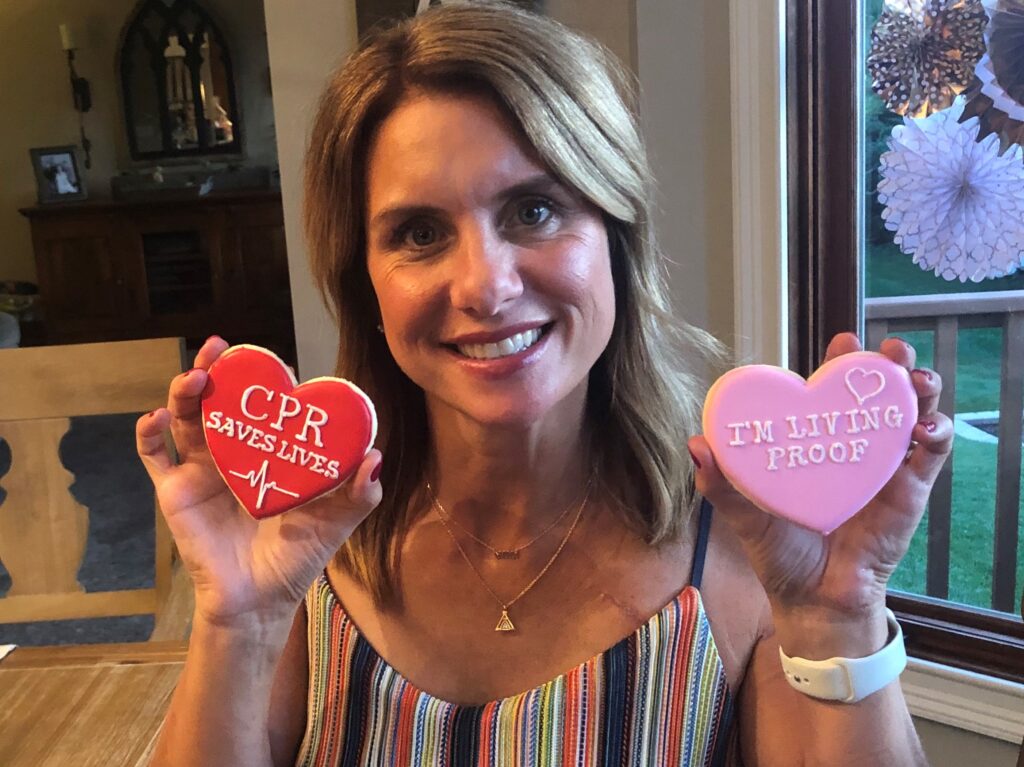
By Gina Mayfield
It was late August 2019, and Saturday morning in the Walenga household was off to its typical All-American start. Kristen Walenga sent her husband off to work and geared up for her team mom duties as she made breakfast for her four children. Her daughter Rose, 14, got ready upstairs for cheerleading pictures and her youngest sons, Sam, 11, and Nate, 9, ran around outside to burn some energy before their youth football game.
The family’s eldest child, Eddie, 15, was in the basement playing video games when he heard a loud crash coming from the kitchen above him, followed by screams for help from his younger brothers who had just come inside. Then the family pet, a certified therapy dog, started howling. That’s when Eddie realized this wasn’t a typical Saturday at all.
He raced up the basement stairs to find his mom in a heap on the floor, and his two little brothers standing there in disbelief. At first, they thought their mother was just playing around.
Eddie, who had taken a Hands-Only CPR class a few years earlier in middle school, quickly realized his mom wasn’t breathing and had no pulse.
His training immediately kicked in and he began chest compressions while little Nate ran to get help from a neighbor. The neighbor’s son, who happened to be visiting, was a former Army medic and ran straight for the Walenga’s kitchen where he found Eddie performing CPR like a champ.
In the midst of the chaos, Sam had the presence of mind to call 911. Paramedics arrived, continued CPR and administered four AED shocks. They got a pulse and transported Kristen to the hospital where, a couple of days later, they removed her from a ventilator. She woke up from a medically-induced coma with an internal defibrillator firmly implanted in her heart at the age of 45.
“So I had a sudden cardiac arrest,” Kristen says. “They were not able to find any reason for it. It’s ‘idiopathic,’ or unexplained. Their best guess is that it was stress induced. I was a full-time teacher, the school year had just started. We’re a very busy family, and I had been working a ton that week.”
Later, one of the paramedics told Kristen that she was very fortunate. “He said that I had so many good things fall into place. Of course, one being a ‘witnessed’ cardiac arrest. Two, having someone at home who could start CPR within a minute or two.”
After some time went by, Kristen sat down with Eddie and said, “How did you know this was the right thing to do? How did you react so quickly and know to start CPR?” Eddie said that even after a couple of years, a few things stuck in his head from that middle school health class, including that he couldn’t do more harm than what was already happening to his mother. Secondly, he recognized that Kristen wasn’t breathing normally, so he knew that meant to start CPR.
Since her cardiac arrest, Kristen has taken what she describes as a serious interest in CPR by taking classes, going through an instructor course and getting certified. As is the case with so many survivors, Kristen immediately felt that it was no accident she was left on this earth.
Being a teacher herself, she questioned why educators weren’t being trained in CPR. “It just seems like a no-brainer. CPR should be a basic skill that everybody has in their pocket.” But it isn’t … yet. “We have several in-service classes that we have to do at the beginning of every school year. We have to know how to administer an EpiPen, manage diabetes and ADHD – all of these really important things. But I can’t think of anything more important than just being able to administer Hands-Only CPR.”
So Kristen discovered her calling: Creating awareness around the American Heart Association’s CPR in Schools program. Schools often don’t know how time- and cost-effective the program can be, and it’s the mission of her foundation, Kristen’s Heart Beats, to change that.
In the end, Kristen went back to those middle school health teachers who made the Hands- Only CPR class happen after writing a grant to the American Heart Association for the CPR in Schools training. They now teach the class at the sixth, seventh and eighth grade levels, but they shared that they initially had some reservations about applying for the grant and teaching the course: How receptive would middle schoolers be? Were they too young? Would they remember it? Is this worthwhile, is it going to work?
But Kristen was living proof they made the right decision. She simply replied, “If you hadn’t written that grant, I wouldn’t be here today.”
This week is National CPR and AED Awareness Week, spotlighting how lives can be saved if more Americans know CPR and how to use an AED. Did you know about 70 percent of out-of-hospital cardiac arrests happen in homes? Learn more about how you could save the life of a loved one by learning CPR today.